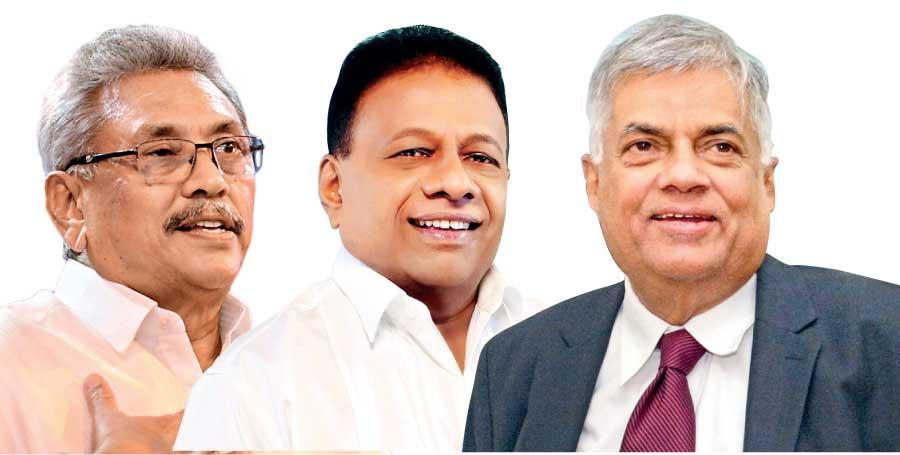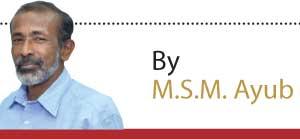Reply To:
Name - Reply Comment

- One would not clearly read President Wickremesinghe’s mind over the forming of an all-party government as he shows a keen interest in it, while at the same time did not positively respond to an important demand by some parties such as the NFF and the main Opposition Samagi Jana Balawegaya (SJB)
- President’s interest in forming an all-party government could be attributed to so many possible scenarios. Firstly, he is now in a way a prisoner of the Sri Lanka Podujana Peramuna (SLPP), the ruling party led by Rajapaksas, in spite of him being the executive President of the country
The all-party government that has been the main topic among politicians since early April is apparently out of the question now. Even the group that first brought the issue into the public discourse – the 11 small political parties that had broken ties with the Gotabaya Rajapaksa government – has already given it up. Vasudeva Nanayakkara, the leader of the Democratic Left Front (DLF) – one of those parties - very clearly told this on Wednesday.
question now. Even the group that first brought the issue into the public discourse – the 11 small political parties that had broken ties with the Gotabaya Rajapaksa government – has already given it up. Vasudeva Nanayakkara, the leader of the Democratic Left Front (DLF) – one of those parties - very clearly told this on Wednesday.
Leaders of two of those parties, Wimal Weerawansa of the National Freedom Front (NFF) and Udaya Gammanpila of the Pivithuru Hela Urumaya (PHU) were sacked from the Cabinet by former President Gotabaya Rajapaksa on March 3 following a meeting they held on the previous day in Thalawathugoda where they were highly critical of the government’s economic policies. However, in an attempt to regain the portfolios, they suggested forming an all-party interim government during a meeting with President Rajapaksa on April 1 on the country’s economic situation.
It was a time when the country was reeling from an unprecedented economic crisis with people experiencing a seven-and-a-half-hour power cut for a day due to the fuel shortage and President Rajapaksa who had lost all options immediately endorsed their suggestion. It soon had the blessings of the Mahanayake Theras of the Malwatta and Asgiriya Chapters while leaders of many small parties who saw an opportunity to become ministers were in a hurry to endorse the suggestion.
However, the Aragalaya or the people’s uprising against the economic downturn scuttled the plan, while politicians were intermittently attempting to revive it. Ranil Wickremesinghe, who after assuming office as the President on July 21 had several rounds of talks with leaders of various political parties over the issue, has by now discouraged almost all of them.
One would not clearly read President Wickremesinghe’s mind over the forming of an all-party government as he shows a keen interest in it, while at the same time did not positively respond to an important demand by some parties such as the NFF and the main Opposition Samagi Jana Balawegaya (SJB). These parties wanted a collective programme of action to resolve the current economic issues before joining the government which seems to be a sensible demand.
There is no basic policy difference between the UNP and the SLPP. Both parties blindly follow the open market economy, despite the President who is not relying on advisors is practising the policy knowledgeably. Both parties had been in power before when many leaders of them had been accused of large-scale corruption
President’s interest in forming an all-party government could be attributed to so many possible scenarios. Firstly, he is now in a way a prisoner of the Sri Lanka Podujana Peramuna (SLPP), the ruling party led by Rajapaksas, in spite of him being the executive President of the country. He is morally indebted to the SLPP first for appointing him Prime Minister in May and later voting him into the top most office in July. Morality apart, the SLPP is the party that wields the majority power in Parliament and he is totally dependent on it, as his party has only one member in the House. Rajapaksas can scuttle any motion or Bill, including the budget presented by Wickremesinghe as the Finance Minister.
If the President could muster support from other parties, especially from the main Opposition, the SJB, it would ease this pressure to some extent. If he also could win over the dissident groups of the SLPP, including that led by Dullas Alahapperuma who was the main contestant against him at the parliamentary vote for the Presidency on July 20, it would be smooth sailing for him. Such an arrangement might also help strengthen his party as well, as many members of the SJB might rejoin the President’s party, the United National Party (UNP).
There is no basic policy difference between the UNP and the SLPP. Both parties blindly follow the open market economy, despite the President who is not relying on advisors is practising the policy knowledgeably. Both parties had been in power before when many leaders of them had been accused of large-scale corruption. The public discourse and especially the Aragalaya have brought to light the fact that all parties that ruled and participated in ruling are responsible for the economic ruination of the country. The former President Mahinda Rajapaksa too during an interview with the Sunday Times had stated “Everybody including me and the previous governments has to answer”, for the country’s ills.
However, the UNP and the SLPP are two parties that fought for power bitterly until the last Presidential and Parliamentary elections since the early fifties, with SLPP having tagged various signboards such as SLFP, PA and UPFA. Only the circumstances, especially the public uprising brought the two parties together in May and more solidly in July. The economic issues and President Gotabaya Rajapaksa’s helplessness paved the way for Wickremesinghe to capture key positions in the government, beating other contenders in the Opposition while the SLPP used him as a buffer against the rising public wrath, a job that he completed efficiently.
Now, that sense of cooperation between the two parties seems to be tapering off with the mutual need of each other gradually declining. The power game seems to be raising its head again. The President in the beginning started strengthening his party getting his party leaders involved in administrative activities. On the other hand, the SLPP is making demands in order to further strengthen its position within the government. The party is not so interested in the so-called all-party government and is in a hurry to form a larger Cabinet of its own which the President is said to be not in favour of.
Meanwhile, the Defence Ministry which is under the President, de-proscribed six Tamil diaspora organisations which had been designated as terrorist organisations by the previous Gotabaya Rajapaksa government and 316 overseas Tamil individuals on August 1. This might have embarrassed the SLPP leaders. Also, media reports said that the SLPP had threatened to vote against the proposed 22nd Amendment to the Constitution Bill (21st Amendment if enacted), unless certain changes are made to the draft that has been presented in Parliament on August 10.
The Sunday Times carried an interesting news item in its August 14 issue which said “Attempts are underway by a section of the SLPP parliamentarians to push for a Cabinet paper through the Prime Minister’s office recommending millions of rupees in compensation for State officials who had been subjected to ‘political victimisation’ under the Yahapalanaya government of 2015 – 2019.” It is interesting since one of the two leaders of the Yahapalanaya government is going to compensate for the “political victimisations” allegedly committed by the same government if this Cabinet paper is approved and implemented. It also indicates the degree of loyalty of the SLPP to the President. This and other differences between the UNP and the SLPP cited above raise the question of whether we are heading towards another “Yahapalana government” where there was a bitter cold war fought between the two main partners of the government.
This again heightens the importance of a mechanism like the proposed all-party government for the President. However, with the socio-economic pressure heaped on the government easing with the absence of miles-long queues for fuel and gas and shortening of power cuts, interest in such a mechanism has almost evaporated.